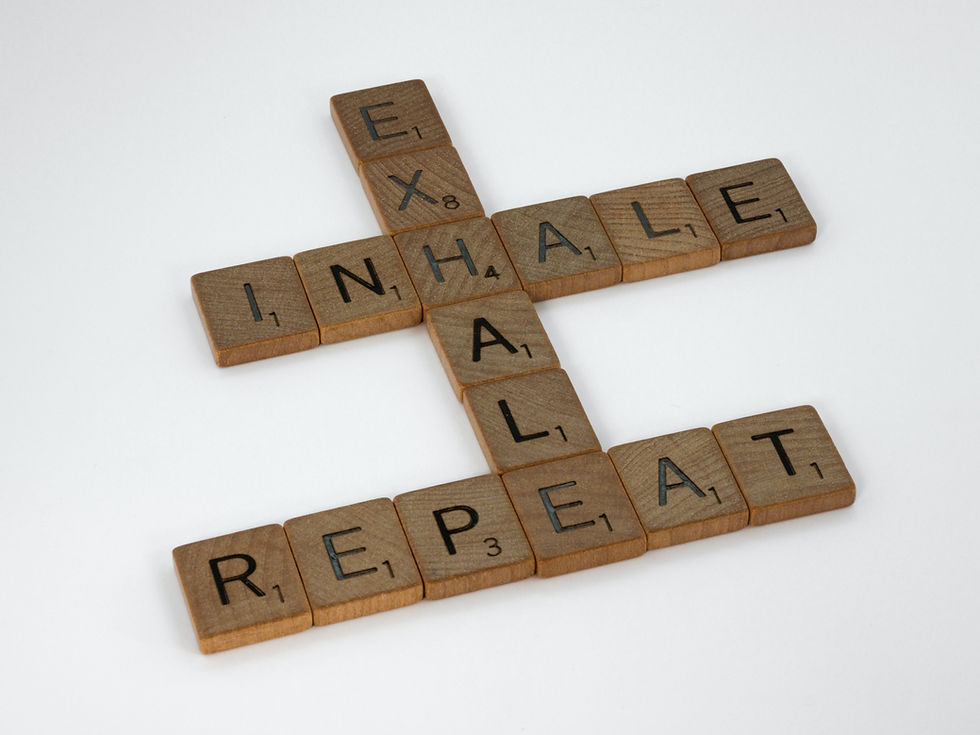Breathing Techniques for Stress Reduction and Better Sleep
- Mary Kate Fuller, MS, CNS, LDN, CHHP

- Nov 11, 2020
- 4 min read
Updated: May 20, 2025
Life can be a lot. Whether you're navigating work deadlines, family responsibilities, chronic health challenges, or just the nonstop buzz of modern life—it’s completely normal to feel overwhelmed, anxious, or worn out from time to time.
You may feel:
Like your mind is racing or foggy
Restless, even when you're physically exhausted
Overwhelmed with a tight chest, racing heart, or persistent fatigue
Like you’re in overdrive mentally, while your body feels worn out
We can’t always control what’s happening around us, but we can control how we care for our internal world. Managing stress isn’t about perfection—it’s about learning to regulate our nervous system and give our body what it needs: nourishment, movement, hydration, sunlight, and rest.
Even something as simple as clearing clutter can help. Neuroscience shows that visual chaos increases cognitive load and stress. Organizing your home or office may feel like a small act, but your brain sees it as a big win.
Take the Time You Need
If you’re running on adrenaline, constantly moving but getting nowhere—pause. Breathe. Give yourself a hug. Be present.
If life has slowed down—embrace it. This is your moment to restore, recharge, and reconnect.
If you feel overwhelmed or anxious—listen to your body. Maybe you need rest… or maybe a brisk walk to move the energy through.
There are many natural and evidence-based ways to support your nervous system, including:
Eating warm, nutrient-dense meals
Daily movement or stretching
Herbal teas with calming properties (like those in Healing Herbal Tea Therapy)
Speaking to your Clinical Nutritionist about personalized plans and supplements
Getting daily sunlight exposure
Practicing breathwork
Let’s Talk Breathwork
Controlled breathing is one of the fastest ways to engage the parasympathetic nervous system—the "rest and digest" state—and calm anxiety. Research shows that breathing techniques can:
Lower cortisol levels (stress hormone)
Improve heart rate variability (a marker of resilience)
Reduce anxiety and improve mood
Support better sleep
Balance blood pressure and heart rate
Enhance focus and reduce reactivity
Here are three proven techniques you can start using right away:
1. 4-7-8 Breathing
(Developed by Dr. Andrew Weil)
This technique is grounding, calming, and incredibly effective for managing acute stress and preparing the body for sleep. It can be done seated, standing, or lying down.
How to do it:
Sit or lie in a comfortable position, feet grounded.
Inhale through your nose for 4 seconds
Hold your breath for 7 seconds
Exhale slowly through your mouth for 8 seconds, gently keeping the tip of your tongue on the roof of your mouth
Repeat for 3–4 cycles. Use it during the day or right before bed.
2. The Sandbag Technique
A mindfulness-based relaxation method
This technique guides the body into deep rest. It helps release muscular tension and gently shifts the nervous system toward sleep or meditation.
How to do it:
Lie on your back with arms by your side
Begin with a few slow breaths (start with 4-7-8 if helpful)
Then shift to even breathing: in for 4, out for 4 (can extend the breath count as you see fit)
As you breathe, imagine your body slowly softening like a bag of sand, releasing one part at a time—starting at your toes and ending at your face and jaw
If your mind wanders, gently return your focus to the breath. You can even picture a calming place, like a beach or forest.
3. Box Breathing
(Used by Navy SEALs and elite athletes)
This technique builds resilience and calm in high-stress situations. It promotes a balanced nervous system and helps reset emotional overwhelm.
How to do it:
Inhale for 4 seconds
Hold your breath for 4 seconds
Exhale for 4 seconds
Hold again for 4 seconds
Repeat for 4–6 cycles. This technique is excellent for transitioning between tasks, calming performance anxiety, or preparing for sleep.
Need More Support?
If you find that your ability to cope with stress feels diminished, it may be due to underlying imbalances. Nutrient deficiencies, neurotransmitter depletion, or adrenal dysfunction can all affect how resilient you feel.
Common contributors include low levels of:
B Vitamins (especially B6, B12, folate)
Magnesium
Amino acids (which build serotonin and dopamine)
Omega-3 fatty acids
Adaptogenic hormone support
Functional testing can provide insight into your stress response, adrenal health, and nervous system resilience. Reach out if you'd like to explore this more deeply.
Some of our Favorite Stress-Soothing Supplements
These are professional-grade options I recommend to support stress response, sleep, and calm:
NeuroMag (before sleep)
Fish Oils (Nordic Naturals or Designs for Health)
Supplements can be purchased in our Fullscript Store.
Final Thoughts
It’s okay to feel unsettled. You’re human. The goal isn’t to eliminate stress completely—but to build the tools and capacity to manage it with more grace, clarity, and calm.
You are not alone. You are not broken. You are simply in the process of recalibrating—and your breath is the gateway to that peace. Start there.









Comments